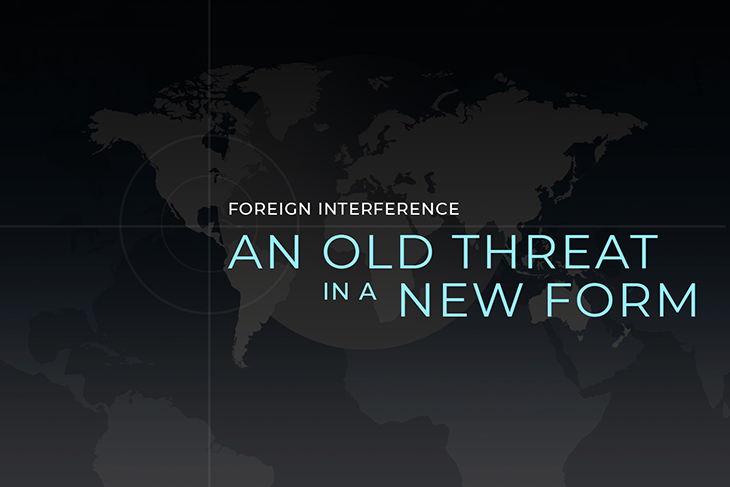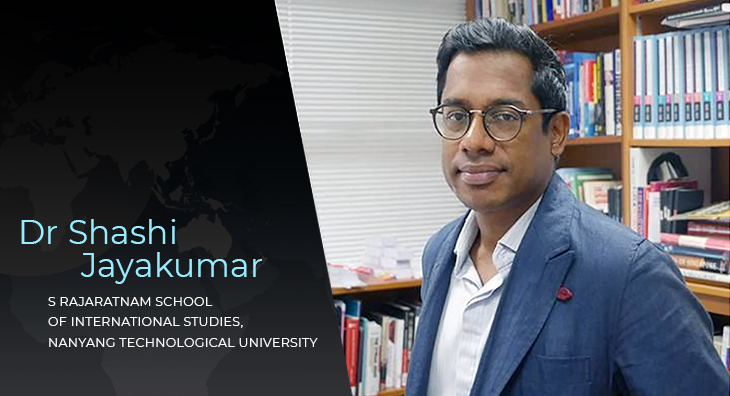
This month, the Ministry of Home Affairs introduced the Foreign Interference (Countermeasures) Bill for First Reading in Parliament. The Bill will strengthen our ability to prevent, detect and disrupt foreign interference in our domestic politics conducted through hostile information campaigns and the use of local proxies.
We spoke to Dr Shashi Jayakumar of Nanyang Technological University’s S Rajaratnam School of International Studies (RSIS) about the threat posed by foreign interference and how clandestine efforts have exploited social media to erode public trust and divide communities. This interview was conducted in 2019 and updated in September 2021.
 What is foreign interference?
What is foreign interference?
If we look at the development of International Relations going back to the 19th century, there was a broad understanding that nation states did not interfere in the sovereign affairs of other nation states. When one state wanted to make another bend to its will, it had a few options, like diplomacy or all-out conflict.
But what essentially seems to have happened over the last 20 years or so is that we’re now in a grey zone where states are not quite at war with one another, but might be taking active measures against other states (some hidden, some partly visible), while having a great deal of plausible deniability about their actions.
What is the danger posed by foreign interference?
What has made this issue acquire greater urgency is the fact that social media has been leveraged or taken advantage of by certain states which are trying to influence others – this is an unparalleled vector for undermining the resilience of a target country.
The exponential speed at which this is done, and the ability to target huge groups quickly and effectively, or even to zoom down and micro-target certain groups – all of these have come into much sharper focus because of social media.
So what we face now is an old threat (i.e. attempting to undermine or influence other states), but the methods and vectors used are new.
What’s the end goal for states that engage in foreign interference?
They obviously want to maximise the space for them to operate. They want to increase, as far as possible, their own sphere of influence, and to optimise their potential military, economic and geopolitical goals.
To expand their spheres of influence, these states will necessarily try to keep their rivals at bay and find ways to severely diminish them, or undermine their social resilience. One method might be to stir up trouble on both sides of the political and ideological spectrum within the target country using an influence campaign (through, for example, a combination of bots and real-world actors). This can keep the target country off-balance or, if done well, destabilise it.
Examples of foreign interference include what Russia is alleged to have tried during the US presidential election of 2016, and the French presidential elections of 2017.
What’s the role of the social media companies in this?
The premise of the social media companies is very attractive: they’ll connect humanity and, through a unified platform, let us all progress to some greater good.
To be fair, they have to some degree connected humanity, but it’s also quite clear that they have also disconnected humanity by pushing people into echo chambers.
In a diverse, polyglot society like Singapore with many different races and religions, we have a rational acceptance that even if we don’t agree with one another, we need to engage with them.
But the effect of social media, especially when digested uncritically, has been to bring us back to a very black-and-white, monochromatic worldview. Radical or extreme voices find a vast common space to connect and validate their deeply-held beliefs.
For the longest time, the social media companies were able to argue that, yes, they have some problematic content, but their community standards will suffice to control objectionable content or hate speech, further arguing they don’t need to be constrained by national law. If you think about it, that’s crazy.
When the book on the history of social media’s impact on society is finally written, I think the social media companies will inevitably be seen to have played a very big part in allowing such conflicts to grow.
In your 2018 submission to the Parliamentary Select Committee on Deliberate Online Falsehoods in February 2018, you noted that Singapore is particularly vulnerable to foreign interference. You’ve since published on the subject in greater detail. Why is Singapore especially vulnerable?
We’re one of the most wired societies on the planet, certainly among the top when it comes to digital penetration and mobile telephony. News travels fast – there’s a slew of illustrative local examples of disinformation, like the “Punggol Waterway Terraces collapse of 2016” – which in fact never happened – and, more recently, COVID-19 vaccine disinformation. And, because of virality, there’s an added urgency to the problem.
Another issue is the sheer normalcy – seeming normalcy – of Singapore. Someone who comes from outside will say that Singapore is clean and green; people can jog on the streets late at night; and we live in harmony. I look at this from a national security perspective and here I would have two observations.
Firstly, people forget that maintaining this stability takes a lot of hard work. Harmony and stability are things that Singapore carefully and constantly tends to, through the work of our security agencies,
Inter-Racial and Religious Confidence Circles,
SGSecure, many community engagement programmes, and so on. We should not forget this.
Secondly, the fact that Singapore’s so cosmopolitan and diverse means there’s a vast attack surface for states if they so desired to try hostile information campaigns that could sunder the various groups (racial or religious) here.
The hostile actor can take advantage of the seeming normalcy – the belief that many of us are conditioned to hold – that nothing serious, security-wise, can ever happen in Singapore.
And, of course, from the point of view of the malicious actor (especially one that has the resources of a state behind it), there are always ways to mask the trail of a wider hostile information campaign, just as there are for cyber-attacks (which are often used in combination with hostile information campaigns).
So even if the defending side chooses to try to uncover the trail back to the source, it’s not a simple matter to attribute the attack to, or call out, the aggressor. This is why Singapore’s extremely careful when it comes to attribution. That said, as I shared during the Parliamentary Select Committee on Deliberate Online Falsehoods in 2018, we cannot assume that hostile information campaigns, including those against us, don’t happen.
In fact, without getting paranoid about things, we should assume that such things regularly happen.
Read Part 2 of this interview:
Countering Attacks on Our Social Resilience
Dr Shashi Jayakumar is the Head of RSIS’ Centre of Excellence for National Security. His research interests include extremism, social resilience, cybersecurity and homeland defence.
First Reading of the Foreign Interference (Countermeasures) Bill
The Ministry of Home Affairs introduced the Foreign Interference (Countermeasures) Bill for First Reading in Parliament on 13 September 2021. The Bill will strengthen our ability to prevent, detect and disrupt foreign interference in our domestic politics conducted through hostile information campaigns and the use of local proxies. Read the Press Release on the Bill.
-04.jpg?sfvrsn=510cb98b_1)
Further Reading
Threat Report: The State of Influence Operations 2017–2020
Facebook, 26 May 2021
“Offensive Cyber” and Espionage: Dirty Secrets No One Talks About
Dr Shashi Jayakumar, RSIS, 4 January 2021
Disinformation and Fake News
Dr Shashi Jayakumar, Mr Benjamin Ang and Ms Nur Diyanah Binte Anwar (Editors), RSIS, 18 November 2020
Google and Twitter Vow to Block Voting Misinformation
BBC News: Business, 11 September 2020
Countermeasures Against Foreign Interference
Mr Muhammad Faizal Bin Abdul Rahman, Dr Gulizar Haciyakupoglu, Ms Jennifer Yang Hui, Ms Dymples Leong, Ms Teo Yi-Ling and Mr Benjamin Ang, RSIS, 17 April 2020
Foreign Interference in Domestic Politics: A National Security Perspective
Mr Damien D Cheong, Dr Stephanie Neubronner and Dr Kumar Ramakrishna, RSIS, 9 April 2020
Cases of Foreign Interference In Asia
Mr Muhammad Faizal Bin Abdul Rahman, Dr Gulizar Haciyakupoglu, Mr Benjamin Ang, Ms Dymples Leong, Ms Jennifer Yang Hui and Ms Teo Yi-Ling, RSIS, 26 March 2020
RSIS Conference on Foreign Interference Tactics and Countermeasures: Speech by Mr K Shanmugam, Minister for Home Affairs and Minister for Law
25 September 2019
Why We Believe Fake News
BBC News: Future, 9 September 2019
European Elections: How Disinformation Spread in Facebook Groups
BBC News: Trending, 30 May 2019
Is Social Media Killing Elections?
BBC News: The Real Story, 26 April 2019
DRUMS: Distortions, Rumours, Untruths, Misinformation and Smears
Dr Norman Vasu, Mr Benjamin Ang and Dr Shashi Jayakumar (Editors), World Scientific Press, 10 January 2019
Elections Integrity in Fake News Era: Who Protects, and How?
Dr Shashi Jayakumar, RSIS, 29 November 2018
Written Representation to the Parliamentary Select Committee on Deliberate Online Falsehoods
Dr Shashi Jayakumar, 27 February 2018
Inside the Russian Troll Factory: Zombie Troops and a Breakneck Pace
The New York Times, 18 February 2018



-04.jpg?sfvrsn=510cb98b_1)

